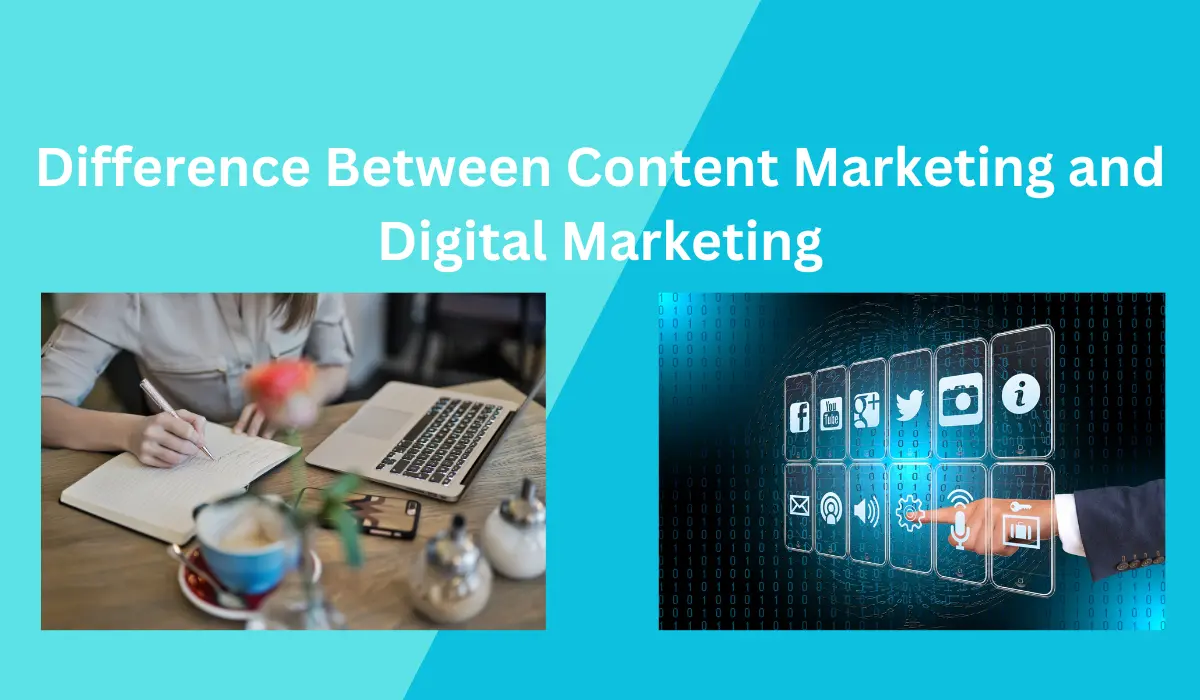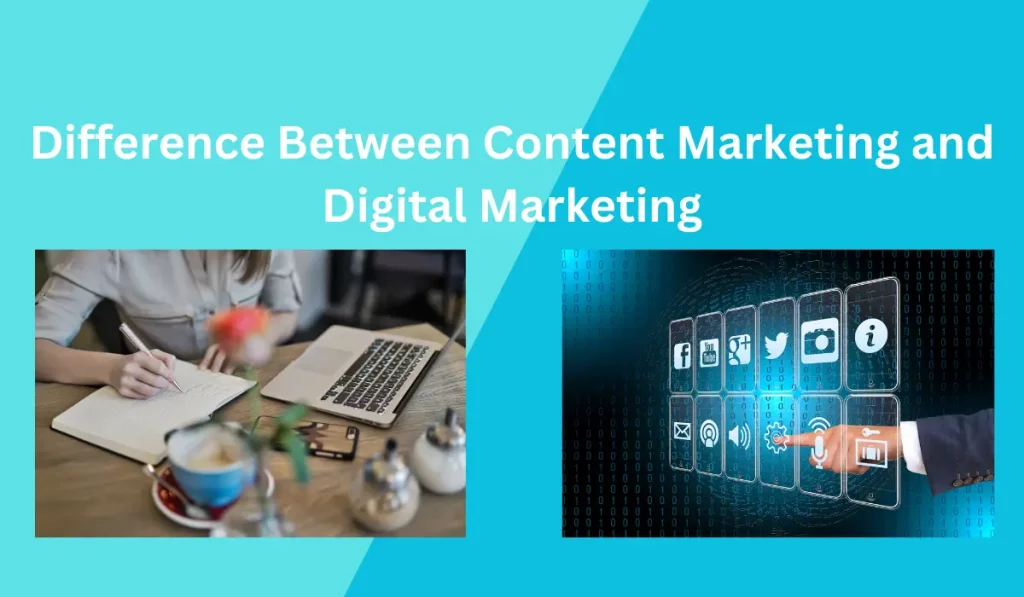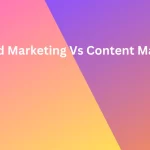Content marketing and digital marketing both are part of inbound marketing. In this context, we talked about the difference between content marketing and digital marketing, the comparison between them, the pros and cons, etc.
Let’s jump into the deep:
What is Content Marketing
Content marketing is a strategic marketing approach focused on creating and distributing valuable, relevant, and consistent content to attract and engage a specific target audience. The primary goal of content marketing is to drive profitable customer action, such as acquiring new customers, retaining existing ones, or increasing brand awareness. Instead of directly promoting a brand or product, content marketing aims to provide valuable information, entertain, or educate the audience, establishing the brand as an authority and building trust with the target market. Content marketing involves various formats, including blog posts, articles, videos, infographics, social media posts, and more, tailored to meet the preferences and needs of the intended audience.
What is Digital Marketing
Digital marketing is a comprehensive term that encompasses all marketing efforts executed through digital channels, technologies, and platforms to connect with current and potential customers. It leverages various online channels and methods to promote products, services, or brands, with the ultimate goal of driving brand awareness, engagement, and conversions. Digital marketing activities can include, but are not limited to, search engine optimization (SEO), search engine marketing (SEM), content marketing, social media marketing, email marketing, influencer marketing, and online advertising. The use of digital tools and analytics enables marketers to measure and analyze the effectiveness of campaigns in real-time, allowing for data-driven decision-making and continuous optimization. Digital marketing has become an integral part of the overall marketing strategy for businesses in the digital age.
Difference Between Content Marketing and Digital Marketing
Content marketing and digital marketing are related concepts, but they have distinct focuses and strategies within the broader marketing landscape. Here are the key differences between content marketing and digital marketing:
Scope and Focus
Content marketing is a subset of digital marketing. It specifically revolves around the creation, distribution, and promotion of valuable and relevant content to attract and engage a target audience. The emphasis is on providing useful information to the audience to build trust and authority.
Digital marketing is a broader term that encompasses all marketing efforts conducted through digital channels. This includes content marketing, but it also covers a wide range of other activities such as search engine optimization (SEO), social media marketing, email marketing, online advertising, and more.
Objectives
The primary goal of content marketing is to provide value to the audience, build relationships, and position the brand or organization as an authority in a specific niche. Content marketing aims to create a loyal audience that is more likely to engage and convert over time.
The objectives of digital marketing are more varied and can include brand awareness, lead generation, customer acquisition, and direct sales. Digital marketing encompasses a range of strategies, each with its own set of goals.
Content Creation vs. Overall Strategy
Content marketing places a strong emphasis on the creation of high-quality, informative, and engaging content. This content can take various forms, such as blog posts, articles, videos, infographics, and more.
Digital marketing is a strategic approach that involves leveraging various online channels and tactics to achieve overall marketing goals. Content marketing is one of the tactics used within the broader digital marketing framework.
Channels Utilized
Content marketing primarily utilizes owned and earned media channels. This includes a brand’s website, blog, social media profiles, and other platforms where content is shared and promoted.
Digital marketing encompasses a wider range of channels, including both organic (SEO, content marketing) and paid (online advertising) channels. It leverages multiple online platforms to reach and engage the target audience.
Timeline and Relationship Building
Content marketing often operates on a more extended timeline, focusing on building a long-term relationship with the audience. The emphasis is on consistently delivering valuable content to nurture leads over time.
While digital marketing can also involve long-term relationship building, certain tactics within the digital marketing umbrella, such as paid advertising, may have shorter-term objectives and quicker turnaround.
In summary, content marketing is a specific strategy within the broader scope of digital marketing. While content marketing focuses on creating and distributing valuable content to build relationships, digital marketing encompasses a more extensive range of online strategies and channels with diverse objectives, including content marketing.
Pros and Cons of Content Marketing and Digital Marketing
Pros of Content Marketing
Content marketing offers various benefits for businesses and brands. Here are some of the key pros of content marketing:
Pros of Digital Marketing
Digital marketing offers numerous advantages for businesses and brands in today’s digital age. Here are some of the key pros of digital marketing:
Builds Brand Awareness:
Content marketing allows businesses to showcase their expertise, personality, and values. Consistent and valuable content helps in establishing brand identity and increasing overall brand awareness.
Global Reach:
Digital marketing enables businesses to reach a global audience. With online platforms and tools, businesses can connect with potential customers across borders, expanding their market reach.
Boosts Website Traffic:
High-quality and relevant content attracts organic traffic to your website. Search engines tend to favor content that provides value to users, leading to improved search engine rankings and increased visibility.
Cost-Effective:
Compared to traditional marketing methods, digital marketing is often more cost-effective. Online advertising, social media marketing, and email campaigns can be tailored to various budget sizes, allowing businesses to allocate resources efficiently.
Engages and Educates Audience:
Content marketing provides an opportunity to engage with your audience by delivering valuable and informative content. This engagement fosters a relationship with your audience and positions your brand as an authority in your industry.
Targeted Advertising:
Digital marketing allows for precise targeting of specific demographics, interests, and behaviors. This targeted approach ensures that marketing messages reach the most relevant audience, improving the efficiency of campaigns.
Generates Leads:
Well-crafted content, such as eBooks, whitepapers, and informative blog posts, can serve as valuable lead magnets. By providing valuable content, businesses can capture leads and nurture them through the sales funnel.
Measurable Results:
Digital marketing provides detailed analytics and metrics that allow businesses to measure the performance of their campaigns in real-time. Marketers can track key performance indicators (KPIs) and adjust strategies based on data-driven insights.
Strengthens Customer Relationships:
Consistent communication through content helps in building and strengthening relationships with your audience. It allows you to address their needs, answer their questions, and provide solutions, fostering trust and loyalty.
Flexibility and Adaptability:
Digital marketing strategies can be quickly adjusted to respond to market changes, consumer behaviors, or emerging trends. This adaptability is crucial in a dynamic and fast-paced business environment.
Enhances SEO (Search Engine Optimization):
Quality content is a critical factor in SEO. Search engines reward websites that regularly produce relevant and valuable content with higher rankings. This increased visibility can lead to more organic traffic.
Interactivity and Engagement:
Digital marketing enables two-way communication between businesses and their audience. Social media, interactive content, and online forums provide opportunities for engagement and dialogue, fostering a sense of community around a brand.
Cost-Effective Marketing Strategy:
Compared to traditional advertising methods, content marketing is often more cost-effective. While it requires an investment of time and effort, the long-term benefits and ROI can be substantial.
Personalization:
Digital marketing allows for personalized content and messaging based on user preferences, behaviors, and demographics. This personalization enhances the user experience and increases the likelihood of conversion.
Demonstrates Thought Leadership:
Through insightful and authoritative content, businesses can establish themselves as thought leaders in their industry. This can lead to increased trust from customers, partners, and industry peers.
Higher Conversion Rates:
Targeted and personalized marketing messages, combined with effective call-to-action strategies, often result in higher conversion rates compared to traditional marketing methods.
Adaptable to Various Formats:
Content marketing is versatile and can be adapted to various formats, including blog posts, videos, podcasts, infographics, and more. This flexibility allows businesses to reach diverse audience preferences.
Immediate Impact:
Digital marketing channels, such as social media and online advertising, can generate immediate results. This is particularly advantageous for businesses looking to promote timely offers or respond quickly to market changes.
Measurable Results:
With the use of analytics tools, businesses can measure the performance of their content marketing efforts. Metrics such as website traffic, engagement, conversion rates, and social shares provide valuable insights for optimization.
Brand Visibility and Awareness:
Through digital marketing, businesses can enhance their online visibility and build brand awareness. Social media presence, content marketing, and search engine optimization (SEO) contribute to a strong online brand presence.
Long-Term Sustainability:
Unlike some short-term marketing tactics, content marketing has a long-term impact. Once content is published, it continues to attract and engage audiences over time, contributing to sustained growth.
Improved Customer Relationship Management (CRM):
Digital marketing tools and platforms facilitate effective customer relationship management. Businesses can use customer data to personalize interactions, provide better customer service, and build long-term relationships.
Supports Sales Efforts:
Well-crafted content can serve as a valuable resource for sales teams. Content that addresses common customer questions or concerns can be shared during the sales process, aiding in the conversion of leads into customers.
Accessibility:
Digital marketing ensures that businesses are accessible to their audience 24/7. Online platforms and websites provide a constant point of contact for customers, allowing them to access information and make purchases at their convenience.
Diverse Content Formats:
Digital marketing allows for the creation and distribution of diverse content formats, including text, images, videos, infographics, and more. This variety accommodates different audience preferences and consumption habits.
Competitive Edge:
Embracing digital marketing strategies provides a competitive edge in the modern business landscape. Businesses that effectively leverage digital channels often outperform competitors still relying solely on traditional methods.
Data-Driven Decision Making:
The availability of data and analytics in digital marketing empowers businesses to make informed decisions. Analyzing metrics helps marketers understand what works and what needs adjustment, leading to continuous improvement.
Cons of Content Marketing
Cons of Digital Marketing
While content marketing has numerous benefits, it also comes with its set of challenges and potential drawbacks. Here are some cons or challenges associated with content marketing:
Time-Consuming:
Content creation, especially high-quality and valuable content, can be a time-consuming process. It requires research, planning, writing, editing, and often collaboration between different teams, which may strain resources.
Results Take Time:
Unlike some forms of advertising that may yield quick results, the impact of content marketing is typically gradual. It may take time to see significant increases in website traffic, engagement, and conversions.
Requires Consistency:
Successful content marketing relies on consistency. Regularly producing and publishing content is essential for maintaining audience engagement and search engine visibility. Consistency may be challenging for some businesses.
Saturation and Competition:
In many industries, there is a saturation of content. Standing out and getting noticed amidst the sea of online information can be challenging. Increased competition may also make it harder to rank on search engines.
Complex Measurement:
While there are various analytics tools available, measuring the direct impact of content marketing on key performance indicators (KPIs) can be complex. Attribution and quantifying the contribution of content to specific outcomes can be challenging.
Content Quality Concerns:
Maintaining consistently high-quality content can be demanding. Rushed or subpar content can negatively impact a brand’s reputation, and ensuring every piece meets a certain standard requires careful oversight.
Changing Algorithms:
Search engine algorithms are continually evolving, impacting how content is ranked and discovered. Keeping up with these changes and adjusting strategies accordingly can be challenging for marketers.
Resource Intensive:
In addition to time, content marketing can be resource-intensive in terms of human and financial resources. Creating multimedia content, such as videos or infographics, may require specialized skills and equipment.
Overemphasis on Quantity:
Some content marketers may fall into the trap of prioritizing quantity over quality. Focusing solely on producing a high volume of content without maintaining its relevance and value can lead to diminishing returns.
Short Attention Spans:
With the rise of short-form content and the prevalence of distractions, capturing and maintaining audience attention is increasingly challenging. Crafting content that resonates in a world of information overload requires careful consideration.
Evergreen Content Maintenance:
While evergreen content can provide long-term value, it may require periodic updates to remain relevant. Failure to update content can lead to outdated information and a decline in search engine rankings.
Risk of Miscommunication:
Communicating effectively through content is crucial. Poorly written or unclear content can lead to misunderstandings or misinterpretations, potentially harming a brand’s reputation.
While digital marketing offers numerous advantages, it also comes with its set of challenges and potential drawbacks. Here are some cons or challenges associated with digital marketing:
Saturation and Competition:
The digital space is highly saturated with content and advertisements. Increased competition can make it challenging for businesses to stand out and capture the attention of their target audience.
Information Overload:
Consumers are bombarded with information online, leading to shorter attention spans and a tendency to skim through content. This makes it difficult for businesses to convey their messages effectively.
Ad Blocking:
The prevalence of ad-blocking software can limit the visibility of digital advertisements. Users who employ ad blockers may not see display ads, reducing the effectiveness of certain online advertising strategies.
Technical Challenges:
Digital marketing often requires technical expertise. Managing websites, implementing SEO strategies, and navigating various digital tools may pose challenges for businesses without the necessary skills or resources.
Data Privacy Concerns:
Growing concerns about data privacy and security can impact the way businesses collect, store, and use customer data. Stricter regulations may limit the ability to personalize marketing messages based on user data.
Ad Fraud:
Digital advertising is susceptible to ad fraud, including click fraud and impression fraud. Businesses may end up paying for interactions that are not genuine, impacting the ROI of their advertising efforts.
Dependency on Technology:
The reliance on digital platforms makes businesses vulnerable to technical issues, server outages, and changes in algorithms. Any disruptions in these areas can affect the visibility and performance of digital marketing campaigns.
Rapid Technological Changes:
The fast-paced evolution of technology and digital platforms requires marketers to stay updated on industry trends. Keeping up with new tools and tactics can be challenging for businesses without dedicated resources.
Negative Feedback Amplification:
Negative reviews, comments, or feedback on social media and other online platforms can quickly spread and harm a brand’s reputation. Managing online reputation becomes crucial in the digital landscape.
Digital Fatigue:
Consumers may experience digital fatigue, leading to a resistance to online advertising and promotional messages. This can make it more difficult for businesses to engage their target audience effectively.
Ineffective Targeting:
While digital marketing allows for precise targeting, ineffective targeting can result in ad fatigue and irritation among users. Poorly targeted ads may be perceived as intrusive and irrelevant.
Short-Term Focus:
Some digital marketing strategies, such as paid advertising, may focus on short-term gains. Businesses that prioritize immediate results over long-term strategies may find it challenging to build sustainable customer relationships.
Quality Concerns:
The ease of publishing online content can lead to a quantity-over-quality approach. Businesses may prioritize producing a high volume of content, sacrificing quality and relevance.
Complex Attribution Modeling:
Determining the exact contribution of each digital marketing channel to conversions can be complex. Multiple touchpoints and channels may be involved, making accurate attribution modeling challenging.
Digital Divide:
Not all target audiences may have equal access to digital platforms. Businesses need to consider the digital divide, where certain demographics may have limited or no access to the internet or digital devices.
Also Read
End Words
We have shared our knowledge about the difference between content marketing and digital marketing, and the pros and cons of content and digital marketing. I hope this article will help you to decide which marketing technique you will implement for your business growth.







